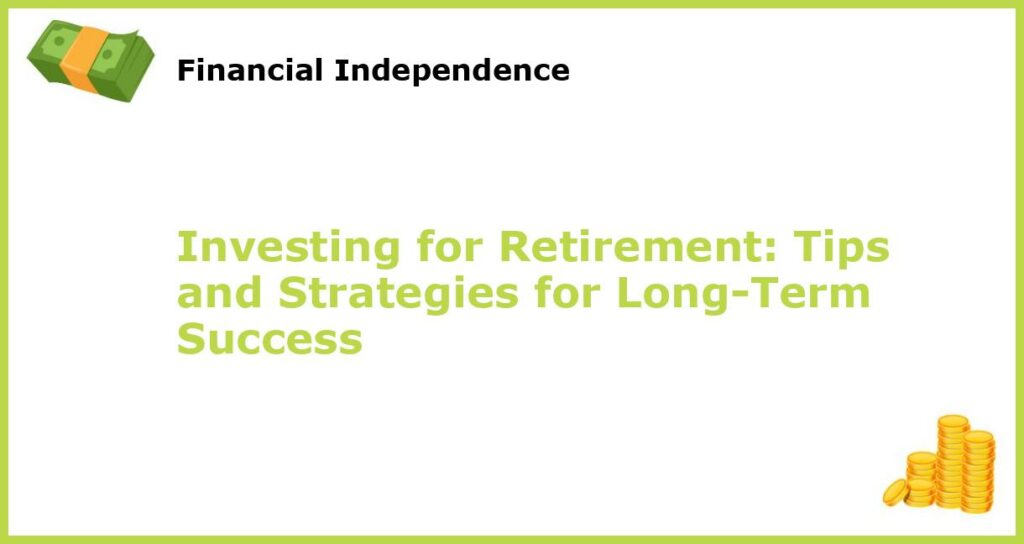Investing for retirement can be a daunting task that requires a lot of effort, patience, and discipline. However, with the right plan and strategies, it can be a rewarding experience that sets you up for long-term financial success. In this article, we’ll explore some tips and strategies you can use to invest for your retirement and achieve your financial goals.
Planning for Retirement: Understanding Your Goals and Priorities

Before you start investing for retirement, it’s important to take the time to understand your goals and priorities. This involves asking yourself questions like “Are you planning to retire early, or do you anticipate working longer?”, “Are you willing to take more risks for potentially higher returns, or do you prefer more conservative investments?” and others.
By answering these questions, you can create a personalized retirement plan that reflects your unique needs and circumstances. This plan will help guide your investment decisions and ensure that you stay on track to achieve your goals.
Choosing the Right Investment Vehicles: Stocks, Bonds, and More

When it comes to investing for retirement, there are a variety of options to consider. Some of the most common investment vehicles include index funds, mutual funds, individual stocks and bonds, or other options like annuities, commodities, or real estate.
It’s important to understand the potential risks, rewards, and fees associated with each option before making a decision. Working with a financial advisor or doing your own research can help you make informed decisions and choose the right mix of investments to meet your retirement goals.
Diversification: Spreading Your Risk Across Different Investments

One key strategy for long-term investing success is diversification. This means spreading your risk across different types of investments like stocks, bonds, cash, and other investment options that align with your goals and risk tolerance.
Diversification helps protect your portfolio from market fluctuations and reduce your overall investment risk. It ensures that you have a well-rounded portfolio that can withstand the ups and downs of the market and maximize your potential returns over time.
The Importance of Starting Early: The Power of Compound Interest

When it comes to investing for retirement, time is on your side. One of the most important factors that contribute to long-term investment success is starting early and consistently investing over time. This helps you take advantage of the power of compound interest.
This means that your money earns interest not just on the original amount you invested, but also on the accumulated interest over time. The earlier you start, the more time your money has to grow and compound, increasing your potential returns over the long term.
Monitoring Your Investments: Staying on Track for Your Goals

Even after you’ve created a retirement plan and chosen your investments, it’s important to monitor your portfolio regularly. This involves keeping an eye on the performance of individual investments, rebalancing your portfolio as needed, and reassessing your goals and risk tolerance over time.
By staying on track and making adjustments as needed, you can help ensure that your investments are aligned with your retirement goals and priorities.
Managing Investment Fees and Taxes: Maximizing Your Returns

Investing for retirement involves more than just choosing the right investments. It also means being mindful of the fees and taxes associated with your investments. High fees can eat into your returns over time, so it’s important to minimize them whenever possible.
Tax-advantaged retirement accounts, such as 401(k)s and IRAs, can also help you maximize your returns and keep more of your money working for you over the long term. By taking advantage of these accounts, you can reduce your taxable income and save more money for retirement.
Adjusting Your Retirement Plan: Flexibility for Life’s Changes
Life is unpredictable, and circumstances can change at any time. While it’s important to create a retirement plan and stick to it, it’s also important to be flexible and adjust your plan as your life circumstances change.
This can include changes in your retirement goals, your employment status, your family situation, and more. By staying adaptable and making changes as needed, you can help ensure that your retirement plan continues to reflect your needs and priorities over time.
Working with a Financial Advisor: Finding Professional Guidance and Support
Investing for retirement can be overwhelming, especially if you’re new to investing or have complex financial needs. Working with a financial advisor can help provide the guidance, support, and expertise you need to make informed decisions and create a retirement plan that’s right for you.
Whether you choose to work with a traditional financial advisor or a robo-advisor, be sure to carefully research your options and choose a partner who aligns with your goals and values.
Staying the Course: The Value of Patience and Discipline
Finally, one of the most important tips for long-term investing success is simply to stay the course. Investing for retirement is a marathon, not a sprint. Market ups and downs are to be expected, and staying patient and disciplined can help you weather those storms and stay on track for your retirement goals.
By maintaining a long-term perspective, staying patient, and remaining disciplined in your approach to investing, you can achieve long-term investment success and enjoy a secure and comfortable retirement.







